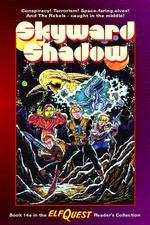

| Elfquest: Skyward Shadow. Written by Bern Harkins and Richard Pini. Illustrated by Delfin Barral and Charles Barnett. Poughkeepsie, NY: Warp Graphics, 1999. 1v. (unpaged). (Elfquest Reader's Collection, Book 13a). $11.95. ISBN 0-936861-49-5. |

|
GENRES: AUDIENCE: SYNOPSIS: After experiencing life on the Scavengers' ship (which includes plants given them by elves), Chandra and the boys are alerted to intruders on the Cam Triompe and realize what must be happening. They and a small rescue party of Scavengers race to the Cam, where they find Rosie captive and Shimmer threatening her captors with energy bolts. When one of the Scavengers sneers that killing a child would be a wonderful thing on the captor's epitaph, the captors, ashamed, release her. The leadership of both factions is brought together, and Shimmer, acting as Binder, resolves the feud. Situation resolved, the Rebels stealthily return to Abode [I'm not sure why]. Scorch looks up his father, who is annoyed at him for not checking in to "let him know he's alive!" Then Scorch learns that this year, no Chirell will be competing in the Wayfair International, a major auto racing event (the Chirells are a major racing family). Despite the risk of capture, Scorch decides to impersonate his cousin Frix and race. However, one of the other racers is Elan Junnard. His uncle just happens to be Halm Junnard, the Skyward official pursuing the Rebels--and he's here in the garage, eager to meet "Frix" and pump him for info about Scorch. Scorch successfully fakes him out. Later Elan overhears "Frix" telling Chandra and Cosmo about the encounter, and their reluctant decision to let Scorch race. However, he diverts his uncle from immediately capturing Scorch when the news breaks that the real Frix is at the Fishery Institute. Elan convinces his uncle that it must be Scorch at the Fishery Institute. Later he confesses to Scorch that he didn't want to knock the only Chirell out of the race. Of course, the Skyward forces quickly determine that Frix is Frix and that Scorch really is racing. However, with limited authority on the surface of Abode, the Skyward is unable to halt the race, so they merely send fighters to tale Scorch as he races. The others are forced to rescue him in the Cam Triompe. From there they travel to Cauldron City, an industrial city on rails that continually circles the polar region of the Mercury-like planet Cauldron, always just ahead of the scorching sun. The Rebels are planning to meet L'cota there. L'cota is there, but he has a plan to turn the Rebels into heroes by letting them save the city from a plot to destroy it. However, the person chosen to carry out the plot--a female terrorist named G'kahrii S'ha--has no intention of doing the minor damage that L'cota wants done. No, she wants the entire city destroyed.... EVALUATION: Part of the problem may be the unbelievable reasonableness of the various people encountered. When the surprise entrance of Cosmo and Scorch into the "derelict" ship results in the death of one of the Scavengers, no one irrationally blames the two. Later, the leaders of the factions are willing to put aside their long feud because of a few words spoken by Shimmer. And when the Rebels are captured during the crisis in Cauldron City, their Skyward captors are perfectly willing to let Scorch go free in order to help save the city. I would have preferred more believably unreasonable behavior from these people, forcing the Rebels to act creatively to accomplish their goals. (I'm reminded of one of the philosophies behind Star Trek: The Next Generation: that humans have managed to put aside their differences and now all work together in harmony. That's a nice dream, but it removes tons of plot possibilities from fiction. The problem isn't quite the same in Skyward Shadow, but you see what I'm getting at, I hope.) The art may also be to blame for removing some of the drama from the book. Though it is certainly attractive and clean, with excellent depictions of people, it's also pretty conventionally structured, and some of the artistic decisions made were not the best. For example, when Scorch's car is shadowed by fighter craft just above, the craft are drawn in such a way as to make them look like the components of a futuristic bridge that Scorch is passing under, rather than moving vehicles. At no time did he look menaced. When Shimmer acts as a Binder, he should look striking and powerful, but both times he exercised his "vocation," he was mostly depicted from the back, with the emphasis instead placed on the people he's judging--thus depriving us of the chance to see him as they see him. It's possible the teaser on the back cover, promising a search for the missing elves that is never delivered, raised my expectations inappropriately. But even taken as regular science fiction this book is only occasionally inspired. I applaud the attempt to create SF with a minimum of combat and bloodshed, but surely there are more interesting plot devices than auto races to fill in the gaps. Recommended as part of the general Elfquest series. |
Return to Rational Magic Home
